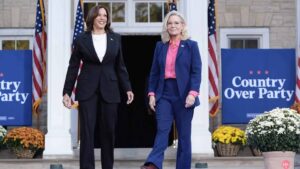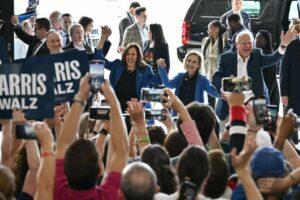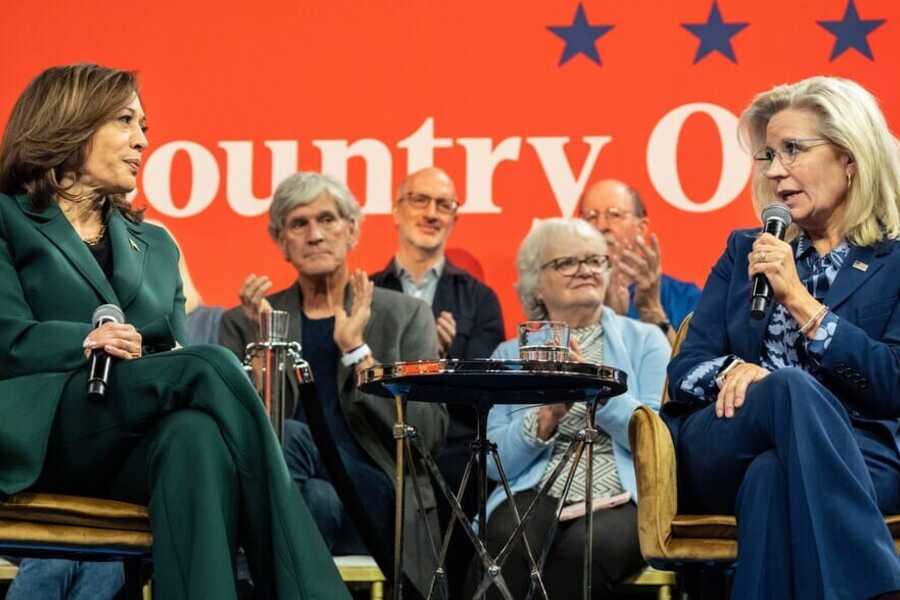In a strategic move to sway Republican voters disenchanted with former President Donald Trump, Vice President Kamala Harris embarked on a three-state tour alongside former Republican congresswoman Liz Cheney on Monday. Their moderated conversations occurred in Pennsylvania, Michigan, and Wisconsin suburban regions, just ahead of in-person voting in Wisconsin.
The conversations, moderated by conservative figures Sarah Longwell and Charlie Sykes, were part of Harris’ push to secure swing voters in the closing weeks of a highly competitive presidential race. Cheney, an outspoken critic of Trump, endorsed Harris in September, marking a significant political cross-party alliance.
Harris and Cheney focused on drawing support from Republicans who were uneasy about their party’s direction under Trump, particularly suburban women and moderate conservatives. “This election challenges us to stand for country over party,” Harris told voters in Malvern, Pennsylvania.
Liz Cheney Takes Center Stage Against Trump
Cheney, known for her fierce opposition to Trump and her role in the Jan. 6 investigation, addressed concerns about Trump’s influence on the country, emphasizing that the election isn’t about partisan differences but about protecting democracy. “Every single thing in my experience and in my background has played a part in supporting Vice President Harris,” Cheney told the crowd. “We may not agree on everything, but I know she’ll always do what’s right for the country.”

Cheney encouraged Republicans to consider voting for Harris, even if they found it difficult to support a Democrat publicly. “You can vote your conscience without ever having to say a word to anyone,” Cheney said, underscoring that many Republicans would vote quietly for Harris come Election Day.
Republican Defectors and Trump’s Response
As Harris and Cheney spoke, former President Trump was in North Carolina rallying his supporters. Trump criticized the unlikely alliance, accusing Cheney of warmongering and warning that her influence could push the country into unnecessary wars. In a social media post, Trump targeted both Harris and Cheney, linking Cheney to her father’s role in the Iraq War and claiming she would lead America into conflict with “every Muslim country known to mankind.”
Despite Trump’s attacks, Cheney’s message resonated with some voters in attendance. George Levy, a former Delaware County, Pennsylvania independent, expressed his support for Cheney and Harris. “Cheney did the right thing for our country,” Levy said. “She believes in democracy, and I appreciate her standing up for it.”
The Stakes for Swing Voters

With Election Day looming, both campaigns focus on battleground states that will likely decide the race’s outcome. Harris’s goal is to appeal to suburban Republicans who may not be able to vote for Trump again. In contrast, Trump is trying to solidify his base in states like North Carolina, where his influence among conservatives remains strong.
While the number of votes Harris and Cheney can sway might be small, their efforts could prove significant in tight races. Joe Zepecki, a Milwaukee-based Democratic strategist, said that even a modest shift in suburban Republican votes could make a difference. “Cheney’s endorsement could persuade Republicans who might need one last push in Harris’ direction,” he said.
Conversations in the Crucial States
At the event in Michigan, Cheney acknowledged the challenges some Republicans face when supporting a Democratic candidate. She reassured voters that they could vote privately for Harris, noting that many Republicans fear backlash or even violence for stepping away from Trump. “But they’ll do the right thing,” Cheney insisted, urging voters to prioritize the country’s future.
Cheney’s message carried significant weight in Wisconsin, a critical battleground state. She reminded the audience of her staunch opposition to Trump after Jan. 6, noting that the consequences of another Trump presidency could be disastrous for American democracy. “I voted to impeach Trump because I knew the stakes, and they haven’t changed,” Cheney said, emphasizing the need for leadership that prioritizes stability over division.
Trump’s Rally in North Carolina
While Harris and Cheney focused on swing voters, Trump spent the day energizing his base in North Carolina. Speaking to a crowd of supporters, Trump doubled down on his criticism of Cheney and Harris, dismissing the conversations as politically calculated. He maintained his stance as the champion of conservative values, urging voters to reject what he called the “radical left’s agenda.”
Despite the political attacks, both candidates are pushing hard in the campaign’s final stretch. Harris’ events this week are expected to be more interactive, allowing voters to engage directly with the vice president. A CNN town hall in Pennsylvania is scheduled for later this week, where Harris will continue her outreach.
Final Weeks Before Election Day
With less than two weeks until Election Day, the stakes couldn’t be higher. Harris is banking on her partnership with Cheney to pull in disaffected Republicans while Trump continues to rally his core supporters. As the race tightens, both campaigns leave no stone unturned in pursuing voters who could tip the scales in crucial swing states.


